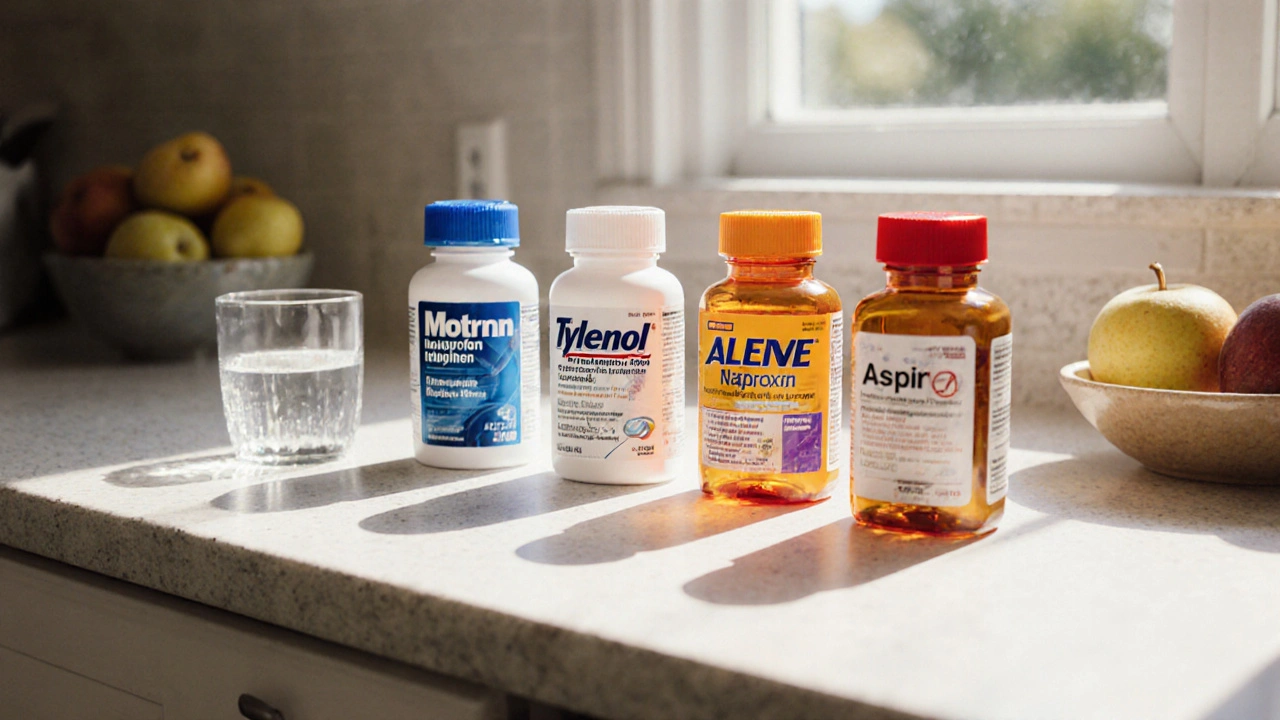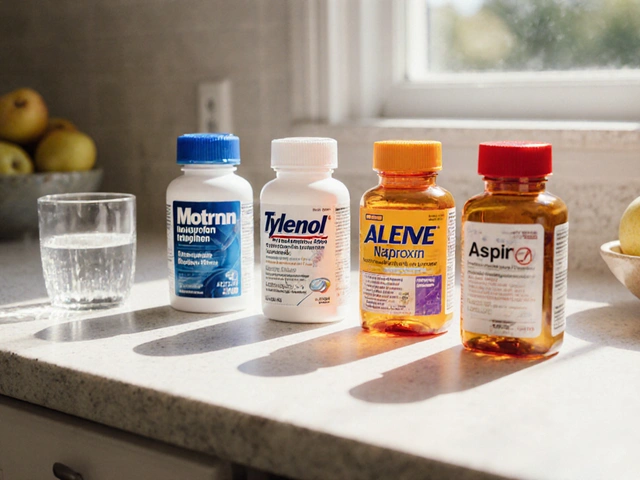Pain Relief Comparison Tool
Use this tool to compare key characteristics of common over-the-counter pain relievers including Motrin (ibuprofen), Tylenol (acetaminophen), Aleve (naproxen), and Aspirin.
Recommended Pain Relief Options
Best for: Inflammatory pain, menstrual cramps
Onset: 30-60 minutes
Duration: 4-6 hours
Stomach Risk: Moderate
Kid-Safe: Yes (with dosage adjustment)
Best for: Fever, mild to moderate pain without inflammation
Onset: 15-30 minutes
Duration: 4-6 hours
Stomach Risk: Low
Kid-Safe: Yes (with dosage adjustment)
Best for: Chronic aches, back pain, arthritis
Onset: 1-2 hours
Duration: 8-12 hours
Stomach Risk: Higher
Kid-Safe: Not recommended under 12 years
Best for: Heart attack prevention, mild pain
Onset: 30-60 minutes
Duration: 4-6 hours
Stomach Risk: High
Kid-Safe: Not for children
| Drug (Brand) | Active Ingredient | Typical Onset | Duration | Best For | Stomach Risk | Kid-Safe (≥6 mo) |
|---|---|---|---|---|---|---|
| Motrin | Ibuprofen | 30-60 min | 4-6 hrs | Inflammatory pain, menstrual cramps | Moderate - take with food | Yes (dose-adjusted) |
| Tylenol | Acetaminophen | 15-30 min | 4-6 hrs | Fever, mild to moderate pain without inflammation | Low - safe on an empty stomach | Yes (dose-adjusted) |
| Aleve | Naproxen | 1-2 hrs | 8-12 hrs | Chronic aches, back pain, arthritis | Higher - avoid if ulcer history | Not recommended under 12 yrs |
| Aspirin | Aspirin (acetylsalicylic acid) | 30-60 min | 4-6 hrs | Heart-attack prevention, mild pain | High - can cause bleeding | Not for children |
When you need quick relief from a headache, muscle ache, or fever, Motrin is an over‑the‑counter (OTC) brand of ibuprofen, a non‑steroidal anti‑inflammatory drug (NSAID) that works by blocking the enzymes that cause pain and swelling. Motrin is popular, but it’s not the only option on the shelf. This guide compares Motrin with the most common alternatives so you can pick the right pill for the situation.
Quick Takeaways
- Motrin (ibuprofen) is best for pain with inflammation, like sprains or menstrual cramps.
- Acetaminophen (Tylenol) works well for fever and mild pain without affecting the stomach.
- Naproxen (Aleve) lasts longer than ibuprofen but takes longer to start working.
- Aspirin is useful for heart‑health benefits but can irritate the stomach and isn’t ideal for children.
- Choosing the right drug depends on age, health conditions, how quickly you need relief, and how long you want it to last.
How Motrin (Ibuprofen) Works
Ibuprofen belongs to the NSAID family. It blocks COX‑1 and COX‑2 enzymes, which produce prostaglandins - chemicals that signal pain, fever, and inflammation. By lowering prostaglandin levels, Motrin reduces the feeling of pain and brings down a fever. The typical adult dose is 200‑400mg every 4‑6hours, not exceeding 1,200mg per day without a doctor’s advice.
Key Criteria for Comparing Pain Relievers
When you line up Motrin against its rivals, look at these factors:
- Onset of relief: How fast the drug starts working.
- Duration: How long the effect lasts before you need another dose.
- Inflammation control: Ability to reduce swelling, not just pain.
- Stomach safety: Risk of gastrointestinal irritation or ulcers.
- Kid‑friendly options: Which drugs are safe for children.
- Interaction profile: Potential problems with other meds or health conditions.
Side‑by‑Side Comparison Table
| Drug (Brand) | Active Ingredient | Typical Onset | Duration | Best For | Stomach Risk | Kid‑Safe (≥6mo) |
|---|---|---|---|---|---|---|
| Motrin | Ibuprofen | 30‑60min | 4‑6hrs | Inflammatory pain, menstrual cramps | Moderate - take with food | Yes (dose‑adjusted) |
| Tylenol | Acetaminophen | 15‑30min | 4‑6hrs | Fever, mild to moderate pain without inflammation | Low - safe on an empty stomach | Yes (dose‑adjusted) |
| Aleve | Naproxen | 1‑2hrs | 8‑12hrs | Chronic aches, back pain, arthritis | Higher - avoid if ulcer history | Not recommended under 12yrs |
| Aspirin | Aspirin (acetylsalicylic acid) | 30‑60min | 4‑6hrs | Heart‑attack prevention, mild pain | High - can cause bleeding | Not for children <12yrs (Reye’s risk) |

Choosing the Right Alternative for Specific Situations
Headache or fever: If you need fast relief and have a sensitive stomach, acetaminophen (Tylenol) often wins because it works quickly and doesn’t irritate the lining.
Joint or muscle inflammation: Motrin or naproxen are better because they actually reduce swelling. Naproxen’s longer action means you might only need one dose for a day of relief.
Menstrual cramps: Many women report that ibuprofen (Motrin) eases cramps more effectively than acetaminophen, thanks to its anti‑inflammatory action.
Heart‑health concerns: Low‑dose aspirin is prescribed for preventing blood clots, but it’s not the go‑to for everyday pain because of bleeding risk.
Kids under 12: Acetaminophen is generally safest. Ibuprofen can be used in children older than six months if weight‑based dosing is followed, but always check the label.
Safety Tips, Interactions, and Common Pitfalls
Even OTC drugs can cause problems if you ignore warnings. Here’s a quick safety checklist:
- Never exceed the maximum daily dose listed on the package.
- Combine NSAIDs (ibuprofen, naproxen, aspirin) with alcohol only if you have a clear stomach tolerance.
- People with hypertension, kidney disease, or a history of ulcers should talk to a doctor before using ibuprofen or naproxen.
- Acetaminophen is metabolized by the liver; avoid taking multiple acetaminophen‑containing products at once.
- Pregnant women in the third trimester should avoid NSAIDs because they can affect the fetal circulation.
When you’re unsure, a short chat with a pharmacist can save a lot of hassle.
Frequently Asked Questions
FAQ
Can I take Motrin and Tylenol together?
Yes, because they work through different pathways. Many doctors recommend alternating ibuprofen and acetaminophen for children’s fever to keep dosing intervals short while staying within safe limits.
Which pain reliever lasts the longest?
Naproxen (Aleve) typically provides 8‑12hours of relief, making it the longest‑acting OTC NSAID. Ibuprofen and acetaminophen usually need dosing every 4‑6hours.
Is aspirin still useful for everyday aches?
Aspirin’s anti‑platelet effect is valuable for heart protection, but for routine aches it’s often avoided because of higher stomach‑bleed risk compared to ibuprofen or acetaminophen.
Can I use ibuprofen if I have high blood pressure?
IBuprofen can raise blood pressure in some people. If you already have hypertension, discuss dosage or alternative options like acetaminophen with your doctor.
What’s the safest pain reliever during pregnancy?
Acetaminophen is generally considered safest throughout pregnancy. NSAIDs, including ibuprofen, should be avoided especially after the 20th week.
Bottom Line
Motrin is a solid, all‑round choice when inflammation is part of the problem. If you need quick fever reduction without worrying about stomach irritation, acetaminophen steps in. For long‑lasting relief, naproxen wins, while aspirin stays in the niche of heart‑health support. By matching the drug’s strengths to your specific need-and keeping health warnings in mind-you’ll get relief without unwanted side effects.








Caroline Johnson October 4, 2025
Motrin? Seriously? It's just another NSAID-pick it if you love a mediocre stomach burn!
Megan Lallier-Barron October 16, 2025
🤔 While every pill claims to be the panacea of aches, perhaps the true relief lies in accepting impermanence… 🌱
Kelly Larivee October 27, 2025
Looks like ibuprofen works best for swelling, but Tylenol is gentler on the tummy.
Emma Rauschkolb November 8, 2025
Indeed, the COX‑1/COX‑2 inhibition profile of ibuprofen accelerates prostaglandin suppression, 🧬 which translates to reduced edema-but watch for GI adverse events. :)
Kaushik Kumar November 19, 2025
Great points, everyone! 🙌 Remember to take ibuprofen with food to protect the stomach, and if you need longer relief, consider naproxen-just stay within dosage limits!!!
Mara Mara December 1, 2025
As an American, I appreciate that Motrin is readily available and affordable-just make sure you don’t overuse it, or you’ll be hurting more than helping.
Jennifer Ferrara December 12, 2025
When evaluating over‑the‑counter analgesics, one must adopt a systemtic approach that considers pharmacodynamic profiles, safety margins, and patient‑specific factors.
Ibuprofen, marketed as Motrin, exerts its analgesic effect through reversible inhibition of cyclo‑oxygenase enzymes, thereby diminishing prostaglandin synthesis.
This mechanism confers both antipyretic and anti‑inflammatory properties, rendering it suitable for conditions such as rheumatoid arthritis and dysmenorrhea.
However, its gastrointestinal tolerability is moderate, necessitating co‑administration with food or antacids in susceptible individuals.
Acetaminophen, sold under the Tylenol brand, lacks significant anti‑inflammatory activity but offers rapid fever reduction with minimal gastric irritation.
Its hepatotoxic potential, though dose‑dependent, underscores the importance of adhering to recommended maximum daily limits.
Naproxen, known commercially as Aleve, provides prolonged analgesia due to its longer half‑life, albeit at the expense of a higher ulcerogenic risk.
Aspirin, while historically pivotal in cardiovascular prophylaxis, is contraindicated in pediatric populations owing to the risk of Reye’s syndrome.
In clinical practice, the selection of an analgesic should be guided by the nature of the pain, comorbid conditions, and the patient’s medication history.
For acute musculoskeletal pain without ulcer history, ibuprofen often represents a balanced choice.
Conversely, for patients with hepatic insufficiency, acetaminophen should be avoided or used with caution.
Elderly individuals may benefit from lower doses of naproxen to mitigate cardiovascular strain.
It is also advisable to educate patients on the signs of gastrointestinal bleeding, such as melena or unexplained anemia.
Furthermore, healthcare professionals must remain vigilant regarding drug‑drug interactions, particularly with anticoagulants and selective serotonin reuptake inhibitors.
In summary, no single analgesic is universally superior; individualized therapy remains the cornerstone of optimal pain management.
Terry Moreland December 24, 2025
I totally agree-personalizing pain relief can really make a difference, and it’s great to see such a thorough breakdown.
Abdul Adeeb January 5, 2026
Indeed, the discourse reflects an exemplary application of evidence‑based recommendations; adherence to such guidelines is paramount.
Abhishek Vernekar January 16, 2026
💡 While the guidelines are solid, let’s not forget the human element-pain is personal, and compassion matters.
Camille Ramsey January 28, 2026
Honestly, if you cant read the table you probably shouldn't be self‑medicating-just read the label!!
Scott Swanson February 8, 2026
Wow, thank you for that groundbreaking insight-who knew reading a label was hard?